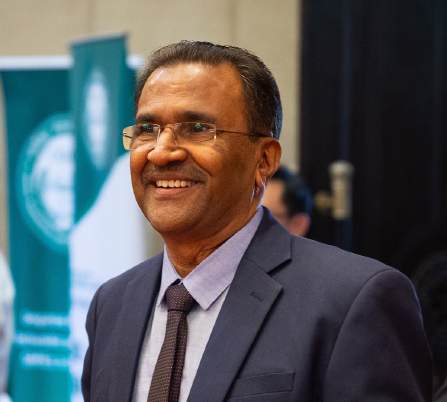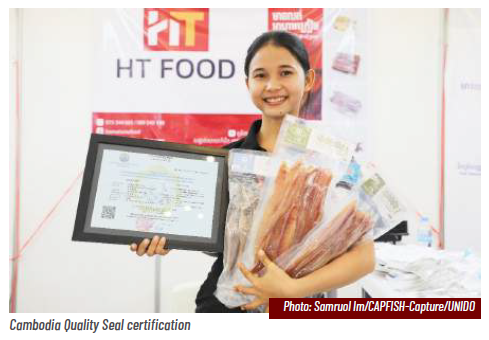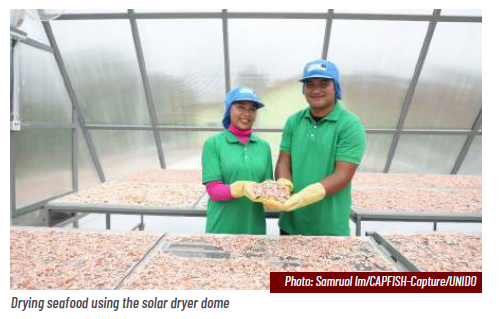Industry Profile: DR SHETTY SEETHARAMA THOMBATHU

Support for national laboratories includes gap assessments and tailored training for ISO 170025 accreditation, ensuring quality testing services. Additionally,
through these efforts, UNIDO aims to enhance the capabilities of both private enterprises and government institutions, fostering improved food safety and innovation in the sector.
1)https://open.unido.org/projects/KH/projects/180039; http://newslettercapfishpostharvest. org/achieve
A: Cambodia aims to export fish and fishery products to the European Union by 2025, and UNIDO is playing a crucial role in this ambition through the CAPFISH-Capture project. This initiative supports the FiA (Competent Authority) in establishing a robust food safety control system, which includes enhancing the policy framework, implementing digital traceability, and achieving ISO accreditation for laboratory testing services. Additionally, it assists post-harvest fishery enterprises and food business operators (FBOs) in meeting food safety standards.
To qualify for EU exports, Cambodia must undergo an audit by the Directorate General for Health and Food Safety (DG-SANTE), scheduled for 2025. In preparation, the FiA is working towards aligning its food control system with global safety requirements, including the execution of the Cambodia Quality Seal (CQS) certification scheme and a comprehensive National Action Plan for Inspection and Control (2020–2024) and implementing National Residue Monitoring Plan (2020-2025). The FiA has also requested an official audit from DG-SANTE and is currently addressing the necessary technical questionnaires.
Looking ahead, a mock audit is planned for March 2025 to identify any gaps in compliance before the official audit in the third quarter of 2025. With these efforts, Cambodia is positioning itself to become an eligible exporter of fish and fishery products to the EU market.

A: The official control system in the fisheries value chain has ensured compliance with food safety and public health regulations. So far, this has led to the exports of fish and processed products to China, Australia, New Zealand, Republic of Korea, and other ASEAN countries. The CAPFISH-Capture project has helped over 40 enterprises improve food safety and gain market access. Notable success stories include UNICA, which upgraded its facilities, launched new products and expanded into domestic and export markets. Similarly, another organisation, Home Taste Food, successfully exported its products to Australia with project assistance. The results show that 50% of businesses earned the Cambodia Quality Seal certification; 69% of supported enterprises were women-led; and women accounted for 68% of new jobs created.
The Food Technology, Research, and Innovation Platform (FTRIP) supports collaboration between the fisheries sector and Higher Education Institutions (HEIs) promoting R&D and innovation. It has funded 23 research projects that benefit 20 enterprises, including seven women-led firms, and engaged 68 researchers. This initiative has led to the development of 20 innovative products.
The CAPFISH-Capture project implemented gender mainstreaming guidelines that enhanced women’s empowerment through capacity-building. The project’s successful initiatives earned it the Gender Equality Mobilization Award 20232 at the UNIDO General Conference, recognizing its commitment to advancing gender equality in Cambodia’s fisheries sector.
Q: In light of lessons learned since the CAPFISH-Capture project began operations in 2019, do you envisage any significant adjustments linked to its activities and its presence in Cambodia. In other words, what does the future look like for the project?
A: The CAPFISH-Capture project is scheduled to conclude in December 2025, with no major adjustments expected until then. Since its launch in 2019, the project has successfully implemented initiatives like the Cambodia Quality Seal (CQS), Value Chain Improvement Strategy (VCIS), and the Food Technology, Research, and Innovation Platform (FTRIP). Based on lessons learned, the project recommends scaling these approaches to other agricultural value chains in Cambodia.
As the official fisheries control system is strengthened, it will promote food safety and fair trade. Once Cambodia becomes eligible for EU exports, increased investment in aquaculture and fish processing is anticipated. This system can also be adapted for other agricultural sectors, enhancing food safety and traceability.
Looking ahead, the project aims to foster innovation and address challenges in the fisheries and R&D sectors. Strengthened partnerships with higher education institutions, enterprises, and communities will facilitate collaboration and knowledge sharing. The focus will be on promoting sustainable practices and enhancing R&D investment among enterprises through practical training. These initiatives are designed to ensure sustainable growth and competitiveness in the sector.
























